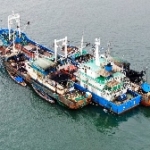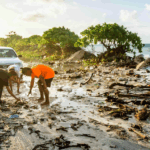On March 27, 2025, the Ghanaian-registered fishing vessel MENGXIN 1 was subjected to an armed attack 16 nautical miles (NM) south of Accra in the Gulf of Guinea.
At 17:53 hours, seven individuals boarded the vessel, discharged warning shots, and held the crew for three hours. During this period, they confiscated mobile phones and gathered the crew on deck.
Upon their departure, the Captain, Chief Mate, and Chief Engineer, all Chinese nationals, were missing and are presumed kidnapped. Lacking mobile network coverage at sea, the remaining crew sailed closer to shore to report the incident and docked at Tema Fishing Harbour. The Ghana Navy, supported by Marine Police and Eastern Naval Command’s Naval Intelligence personnel, initiated an investigation, interviewing the crew to confirm the sequence of events.
Details of the incident were shared with neighboring countries through the ECOWAS Multinational Maritime Coordination Centre (MMCC) Zone F. This event highlights the persistent piracy challenge in the Gulf of Guinea, emphasizing the need for coordinated action under international law and regional frameworks.
Effects: Ripples Across Oceans and Economies
The MENGXIN 1 attack sends shockwaves far beyond its deck, touching human lives, economic systems, and global networks with intricate detail. The human toll begins with the three kidnapped Chinese nationals, veteran seafarers whose expertise drives the vessel, now pawns in a likely ransom scheme, a tactic refined by Gulf pirates since the 2016 kidnapping surge off Nigeria, where 62 crew were seized in one year (IMB). The remaining crew, emerging from their three-hour refuge below deck, carry the weight of survival, each echo of gunfire a memory etched deep, their trust in the sea shaken.
Families in China, linked to Ghana’s fishing trade through bilateral agreements like the 2020 Sino-Ghana fisheries pact, face a vigil of dread, their loved ones’ voices silenced by the pirates’ haul of phones. Onshore, Ghana’s coastal communities, over 2.7 million people tied to fishing according to the World Bank’s 2020 estimate, feel the pinch as the vessel’s downtime halts its catch, slashing daily incomes that hover around $2 per capita in fishing hubs like Tema.
Economically, the ripple widens. Ghana’s fishing industry, contributing 1.2% to GDP and exporting $200 million in fish annually (FAO, 2021), stumbles as vessels like MENGXIN 1 sit idle. Insurance underwriters, already reeling from 132 Gulf piracy incidents in 2020 (IMB), respond with rate hikes, some premiums doubling after similar attacks as seen post-2019 MV Bonnie off Togo, burdening operators and threatening the viability of small fleets. China, a major player with over 50 fishing vessels in Ghanaian waters under joint ventures, may flex its diplomatic muscle, as it did in 2019 when 14 Chinese crew were kidnapped off Nigeria, prompting talks of naval escorts. This pressure could strain Ghana’s foreign relations, already delicate amid trade negotiations with Beijing’s Belt and Road Initiative.
Globally, the attack reverberates through supply chains. Ghana’s fish, including tilapia, tuna, and sardines, feed markets in Europe, such as Spain, importing $50 million yearly, and Asia, like Japan, a $30 million buyer, per 2022 UN Comtrade data. A single vessel’s disruption tightens supply, nudging up prices in Tokyo sushi bars or Lisbon fish markets, a subtle but real echo of piracy’s reach. Shipping lanes also feel the chill. The Gulf’s 6,000-kilometer coastline, a conduit for 5% of global oil via Nigeria and Angola (OPEC, 2023), grows riskier, prompting rerouting or armed guards that inflate costs passed to consumers worldwide. The MENGXIN 1 attack, then, is not just a local tragedy. It is a thread in a vast economic tapestry, unraveling from Accra to the world.
Risks: The Perfect Storm Brewing
The attack exposes a volatile mix of risks. Fishing vessels like MENGXIN 1, small and unarmed, drift far from shore, 16 NM in this case, lacking speed or defenses against pirate speedboats bristling with AK-47s, a pattern in 95% of Gulf attacks (IMB, 2021). The Gulf of Guinea’s geography, busy with oil tankers and trade yet thinly patrolled, invites predation. Communication fails them. No mobile coverage at 16 NM left the crew mute, a modern flaw stark against the satellite-reliant norms of 2025 shipping. Pirate tactics have morphed, abandoning oil theft, once 61 incidents in 2011 (IMB), for kidnapping, a shift honed since the 2015 Delta surge. Overfishing, depleting Ghana’s coastal stocks by 30% since 2000 (FAO), pushes vessels beyond the 12 NM safety net, intertwining ecology with crime.
Piracy vs. Armed Robbery: Decoding the Crime Scene Under UNCLOS
The attack’s classification hinges on a critical legal distinction enshrined in the United Nations Convention on the Law of the Sea (UNCLOS, 1982). Article 101 defines piracy as illegal acts of violence, detention, or depredation committed for private ends on the high seas, beyond a state’s 12 NM territorial sea, or in areas outside any state’s jurisdiction.
At 16 NM, the MENGXIN 1 incident falls squarely under this umbrella, an international heist triggering UNCLOS Article 105, which permits any state to seize pirate vessels on the high seas and prosecute under universal jurisdiction. Armed robbery at sea, conversely, occurs within the 12 NM limit, governed by national law, Ghana’s Maritime Offences Act, for instance, and lacks the global scope of piracy.
The 2019 MV Bonnie case off Togo, at 10 NM, was armed robbery, handled solely by Togolese authorities, unlike the MENGXIN 1’s piracy status, which activated the ECOWAS MMCC Zone F and Yaounde Architecture’s regional alert to Togo, Benin, and Nigeria. This distinction drives response scale: piracy demands multinational coordination, while robbery stays local. Yet, pirates may exploit these boundaries, slipping into territorial waters to evade international pursuit, a loophole UNCLOS struggles to close.
Response: A Race Against Time
The Ghana Navy leapt into action, probing the attack with Marine Police and Eastern Naval Command interrogations at Tema. The ECOWAS MMCC Zone F, under the 2013 Yaounde Code of Conduct, alerted Togo, Benin, and Nigeria, echoing the 2020 MV Curacao Trader response off Nigeria, where regional intel-sharing narrowed the search. Intelligence agencies, wielding satellite feeds and human networks, chase the kidnappers, racing to free the crew before ransom talks, or worse, solidify.
The Bigger Picture: Gulf of Guinea as Piracy’s Wild West
The Gulf of Guinea has morphed into piracy’s Wild West, a lawless expanse rooted in history and sustained by systemic rot. The 2010s oil boom, with Nigeria’s output hitting 2 million barrels daily (OPEC, 2015), ignited piracy, peaking at 61 oil thefts in 2011 (IMB). As oil security tightened with initiatives like Nigeria’s 2019 Deep Blue Project, kidnapping took hold. The IMB tallied 135 crew seized in 2020, followed by 98 in Q1 2021 alone, a trend born in the Niger Delta’s militant chaos of the 2000s where groups like the Movement for the Emancipation of the Niger Delta (MEND) pioneered maritime raids, attacking Shell platforms and kidnapping expatriates.
The MENGXIN 1 mirrors the 2019 Duke attack off Equatorial Guinea, where 7 crew were held for 34 days, or the 2018 MT Barrett off Benin, a 6-day hostage crisis resolved only after ransom talks. Today, the Gulf claims an estimated 35% of global piracy (IMB, 2020 projection), outpacing Somalia’s decline after 2012, when international naval patrols like EU NAVFOR Atalanta and NATO’s Operation Ocean Shield slashed incidents from 237 to 75 in two years (IMB).
Onshore, a power vacuum festers. Nigeria’s navy, with just 25 patrol vessels for 853 km of coast (Jane’s Defence Weekly, 2023), struggles to cover its Exclusive Economic Zone (EEZ), while Ghana’s fleet, 10 ships with half operational per a 2022 Ghana Navy report, lacks the range to patrol beyond 50 NM effectively. Corruption siphons resources. Nigeria lost $1.3 billion to oil theft in 2022 (NEITI), funds that could bolster maritime security but instead line criminal pockets. Poverty drives the cycle, with 60% of Nigerians below the poverty line (World Bank, 2020) and Ghana’s coastal youth, earning $1-2 daily, lured by piracy’s promise of quick cash, as seen in the 2017 arrest of 15 Ghanaian pirates off Takoradi linked to local unemployment. Offshore, this breeds a frontier where pirates operate from hidden creeks, like the Bonny River, using speedboats bought with ransom millions, a self-sustaining ecosystem unchecked by the Yaounde Code’s underfunded ambitions or UNCLOS’s legal reach.
Comprehensive Risk Analysis and Response
A meticulous analysis dissects the risks and countermeasures, offering a roadmap to confront this crisis:
- Vulnerability of Fishing Vessels: Small, unarmed vessels like MENGXIN 1 drift 16 NM from shore, slow and defenseless against pirate speedboats armed with AK-47s, a vulnerability exploited in 95% of Gulf attacks (IMB, 2021). Most lack even basic security, radar, or armed guards, unlike oil tankers fortified post-2011. Crews, often 10-15 strong, rely on hiding, as seen here, with no means to repel boarders. Mitigation: Train crews in evasion tactics, such as zigzag sailing to disrupt pursuit, and non-lethal defenses like high-decibel sirens and strobe lights to disorient attackers, delivered through Marine Police and fishing union courses modeled on Somalia’s 2010s crew training programs that cut hijackings by 30% (UNODC). Equip vessels with panic buttons linked to naval bases, a $500-per-unit fix trialed in Nigeria’s 2022 Deep Blue rollout, enhancing response time.
- Geographic Exposure: The Gulf’s 6,000 km coastline teems with oil tankers and trade, yet its navies patrol thinly, leaving gaps like the 16 NM zone off Accra. Pirates exploit this, launching from uncharted creeks, a tactic honed in the 2015 Delta surge where 40 attacks hit within 20 NM (IMB). Ghana’s EEZ, 218,000 km², sees just 2-3 patrol boats daily, per 2023 naval logs. Mitigation: Deploy Navy patrols and private armed escorts in high-risk 12-20 NM zones, coordinated by Eastern Naval Command and Yaounde joint ops, mirroring Nigeria’s 2020 patrol boost that halved incidents in six months (IMB). Test drone surveillance, like the $10 million UAV program in Cameroon’s 2023 pilot, spotting threats from 50 km away and relaying coordinates to fast-response craft.
- Communication Breakdown: No mobile coverage at 16 NM silenced the MENGXIN 1 crew, a flaw echoing the 2018 MT Barrett attack off Benin, where a 6-day delay stemmed from signal loss. Most fishing vessels lack satellite comms, unlike merchant ships under IMO’s SOLAS mandates, leaving them blind beyond 10 NM. Mitigation: Equip vessels with satellite phones, costing $1,000 each, and Very Small Aperture Terminal (VSAT) systems for real-time distress calls, subsidized by Ghana and ECOWAS via a $5 million fund akin to the IMO’s 2021 West Africa grant. Add Automatic Identification System (AIS) trackers with panic buttons, a $200-per-unit upgrade, proven in the 2019 Gulf of Aden trials to cut response times by 40% (IMO).
- Kidnapping as a Tactic: Pirates now prioritize crew over cargo, abducting the MENGXIN 1’s three Chinese nationals, a shift from oil theft (61 cases in 2011, IMB) to hostage-taking, with 135 abductions in 2020 alone. They target foreign crew for higher ransoms, averaging $50,000 per head (Risk Intelligence, 2022), using speedboats to retreat to hidden bases. Mitigation: Enhance ECOWAS MMCC Zone F with real-time data sharing, integrating AIS feeds, satellite imagery, and AI pattern analysis to predict pirate routes, funded by Gulf states and the IMO’s $10 million 2024 pledge. Expand the Yaounde Code’s joint task forces, like Zone F’s 2023 drills with Benin, to intercept kidnappers within 48 hours, a tactic that freed 10 crew off Togo in 2021.
- Environmental/Operational Push: Overfishing, slashing Ghana’s coastal stocks by 30% since 2000 (FAO), drives vessels beyond 12 NM into pirate zones, with 60% of Ghana’s 11,000 artisanal boats now fishing past 15 NM (2022 Fisheries Commission report). Long trips stretch fuel and crew endurance, thinning defenses. Mitigation: Create onshore jobs in fish processing and renewables, targeting 10,000 youth via Ghana-NGO partnerships with China’s $20 million 2023 aid package, cutting pirate recruitment as Senegal’s 2021 program did by 15% (UNDP). Deploy floating safe buoys, solar-powered with cameras and SOS beacons, in a 50-unit pilot near Accra backed by IMO’s $2 million 2024 grant, offering refuge and surveillance like Malaysia’s 2019 Malacca Strait buoys that deterred 20 attacks.
Addressing Piracy in the Gulf: Solutions, Human Impact, and a Call to Action
The MENGXIN 1 attack underscores the need for effective measures to combat piracy in the Gulf of Guinea, blending practical solutions with a recognition of its human toll and a challenge for decisive action. Satellite communications, mandated by the International Maritime Organization’s Safety of Life at Sea (SOLAS) Convention, enable vessels to send instant distress alerts, addressing the communication gaps exposed in the incident. Drones, as trialed in Nigeria’s 2022 Deep Blue Project, provide early detection of threats, enhancing maritime surveillance.
Crew training in the use of flares and sound cannons, a method proven to reduce hijackings during Somalia’s piracy decline in the early 2010s, equips fishers with tools to deter attackers. Onshore job creation, modeled on Senegal’s 2021 initiative that employed thousands in fish processing, reduces the economic incentives driving pirate recruitment. Additionally, floating safe zones, equipped with cameras and SOS beacons, a concept proposed by the IMO in 2023, offer vessels a secure refuge in high-risk areas. These strategies integrate enforcement under the United Nations Convention on the Law of the Sea (UNCLOS) with innovative approaches to bolster security.
The human dimension of this crisis remains central. The MENGXIN 1 crew, some hiding in a safe room during the three-hour ordeal, others taken as hostages, represent more than data points; they are individuals whose lives and families, particularly in China, are profoundly affected.
Each incident alters livelihoods and communities, both on deck and ashore, highlighting the urgency of protective measures. This event is not an isolated case but a critical signal of a broader challenge. Under UNCLOS, the Yaounde Code of Conduct, and the pressing need for resolution, responsibility falls to Ghana, ECOWAS, China, and the international community to act. The question remains: who will step forward to address this persistent piracy threat and secure the Gulf of Guinea?
–
Email: [email protected] /[email protected]
Tel: 0249160604
DISCLAIMER: The Views, Comments, Opinions, Contributions and Statements made by Readers and Contributors on this platform do not necessarily represent the views or policy of Multimedia Group Limited.
- President Commissions 36.5 Million Dollars Hospital In The Tain District
- You Will Not Go Free For Killing An Hard Working MP – Akufo-Addo To MP’s Killer
- I Will Lead You To Victory – Ato Forson Assures NDC Supporters
Visit Our Social Media for More




